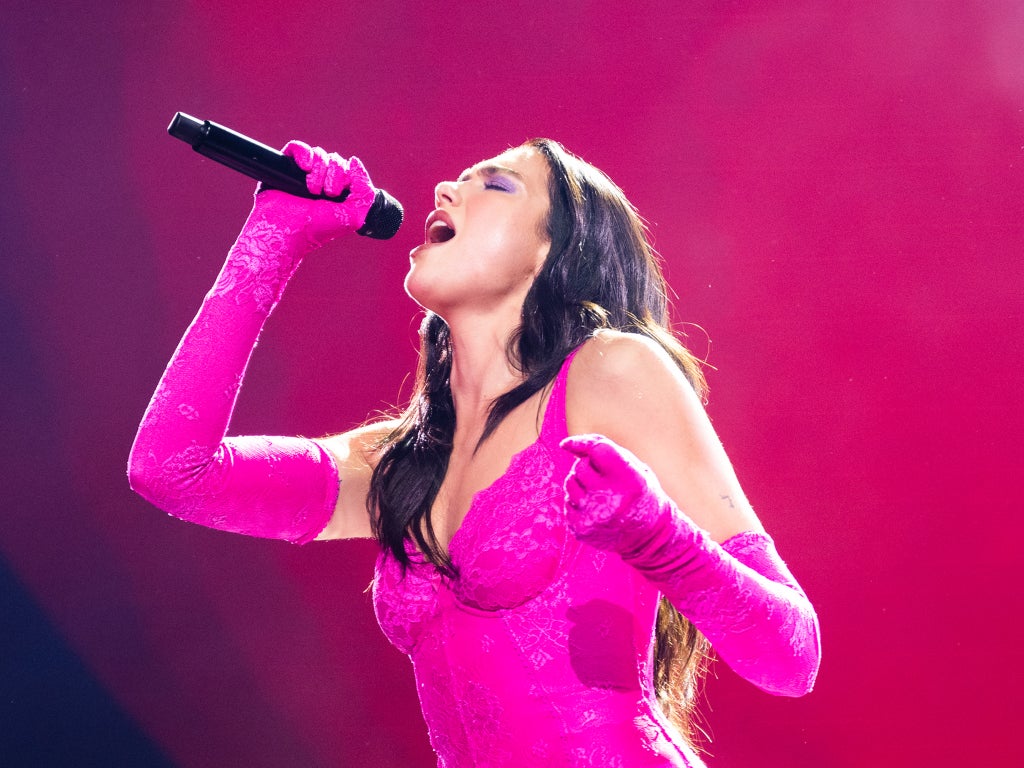
A few days before her triumphant homecoming gig at London’s O2 Arena – delayed for two years by Covid – Dua Lipa spoke about being trolled for her dancing. Clips from early performances always seemed to go viral, with Lipa at the mercy of listless choreography that called for lengthy sections of repetitive limb shimmying. “I love her lack of energy,” read an infamous YouTube comment in 2018. “Go girl, give us nothing.”
Lipa said that the criticism left her doubting herself and whether she was good enough to be a pop star. At the O2, Lipa leaves her critics in the dust. Strutting on stage as if she has something to prove, she is slung over dancers’ shoulders and shoved under legs, her husky vocals pristine, her setlist immaculate. As a result, that early lethargy looks more and more like a short-lived effect rather than a lack of charisma – detached, streamlined cool that rejected the maximalist spectacle of the pop queens who reigned at the time, from Reputation-era Taylor Swift to Ariana Grande circa Dangerous Woman.
Lipa’s Future Nostalgia show – named after her barnstorming second album – fits somewhere in between. There is glitter, pink spandex and a parade of dancers, but also an intriguing iciness. It’s there in the pouty close-ups of its star eyeballing the crowd on a massive screen. It’s also there in the set design, with its flashing bulbs and slow-moving gangways resembling a Star Wars spaceship. It is sometimes disorienting. In lieu of a narrative, the show feels like a mood board sprung to life: Dune! Jane Fonda! The poster for Drive! A giant inflatable lobster for Lipa to croon to! Other than Lipa herself, there’s no connective tissue bridging different moods and aesthetics.
The setlist more than makes up for that, though. Acting as a reminder of the sheer number of bangers to her name, it spins through bop after bop. The shimmering “Cool” is transformed into a funk power ballad via an electric guitar, “Hallucinate” gets blown out into an arena-shaking racket, and Lipa’s star-making “New Rules” is used as an early call for audience gyration. On Future Nostalgia, the slow, syrupy “Boys Will Be Boys” is a bit like a hearse careening into a pride float, but Lipa fixes it here, introducing Latin pop elements and then samples of Gwen Stefani and Missy Elliott.
In all, Lipa’s O2 gig serves as a kind of reclamation, not only for her pop star credibility, but also for Future Nostalgia as an album, which had the unfortunate distinction of soundtracking many of our earliest pandemic months. Released just days after the UK first went into lockdown, it today feels synonymous with emotional distraction and underlying dread. Would revisiting it two years later serve as the concert equivalent of a depressive flashback? Fortunately, no. A blissful spectacle, it’s a testament to Lipa’s existence as the UK’s great pop music hope. Whether we’re inside or outside a pandemic, we’re lucky to have her.







